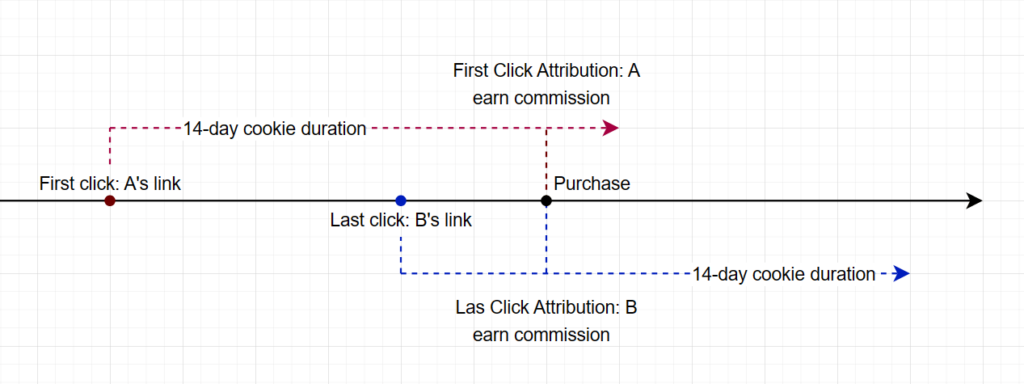
What is the cookie duration?
Firstly, let’s talk about what cookies are.
Imagine you go to someone else’s house to visit. And the host makes a note about you. In this note, he writes down what you did in their house, like what TV programs you watched, or the food you loved the most. The note is called a cookie.
So, what is the cookie duration?
In simple terms, cookie duration is about how long the host keeps the note about you. If the cookie duration is 10 days and you come again on the 9th day, they can recognize you (and the food you love) simply by checking the note. However, if you come in the day 11 when the host has already thrown away the note, they have forgotten you and the food you love.
The same thing happens when your browser accesses a website (the host). A website records your behavior into a piece of information, and that piece of information is called a cookie.
Cookie duration refers to the length of time a web browser stores a particular cookie on a user’s device after they visit a website.
Please note that cookies are not programs, viruses, or spyware. They are simple text files and legally accepted. Additionally, a user has full control over their cookies and can manage them through their browser settings.
What is cookie duration in affiliate marketing?
Cookie duration is not just a technical aspect; it is a vital component of an Affiliate Program.
In affiliate marketing, “cookie duration” is a time limit that determines how long an affiliate gets credit for a sale after someone clicks on their referral link.
So, if a customer clicks on an affiliate’s link and makes a purchase within that time limit, the affiliate earns a commission. The cookie duration is essentially a timeframe during which the affiliate can earn commissions for sales generated through their links. If the visitor purchases after the cookie expires, you will not get any credit for the sale.
The cookie’s duration in affiliate marketing is diverse. It can vary from a few hours to a few months, depending on the merchant’s strategy.
A 30-day cookie duration is the typical duration used by affiliate programs today. If you purchase within 30 days of clicking the link, the affiliate program will be able to attribute the sale to the original referrer and pay them a commission.
Some merchants even offer lifetime cookies, which means that you will earn commissions from any future purchases made by the same customer, as long as they don’t clear their browser cookies or use a different device.
In today’s era, business owners use affiliate management apps that allow them to set up multiple types of cookie durations at the same time. Such software support specialized duration in different products, affiliates, or times of year. They also have added-in fraud prevention tool to detect cookie stuffing.
First-click and last-click attribution in affiliate marketing
Now, let’s delve into first-click and last-click attribution.
First-click attribution gives credit to the affiliate who initially referred the user, focusing on the introduction of the customer. In contrast, last-click attribution credits the affiliate whose link was clicked just before the purchase, emphasizing the final step in the customer’s journey.
Here is an example:
- A customer reaches a product through a link on Affiliate A, triggering a 14-day cookie. On the 10th day, the customer clicks on Affiliate B’s link and eventually buys the product via this link.
- In first-click attribution, the sale credits Affiliate A for the initial referral.
- In last-click attribution, it attributes the sale to Affiliate B since they were the last touchpoint.

Both attribution models consider the duration of the cookie, determining the timeframe within which affiliates can secure commissions based on their respective roles in the customer’s path.
Long cookie – short cookie duration
Choosing the right cookie duration for your affiliate program is important. The length of this period can impact how well your affiliate program works because it needs to balance what’s best for both you and the affiliates.
If you’re thinking about where to start, the optimal number is 30 days. This time frame is great because it gives customers enough time to think about their purchases. Customers don’t just rush into shopping today. 81% of them do online research and they often read 1 to 6 reviews before placing an order. Therefore, a 1-month duration allows affiliates to follow up with the people they refer and helps build customer loyalty over time.
Now, short cookie durations have their ups and downs. The good part is that affiliates might get paid more often, and they can quickly see the results of their efforts. But the downside is that there might be fewer sales in total, which means less commission for the affiliates.
On the flip side, long cookie durations also have their good and bad points. The good stuff includes
- helping affiliates build long-term relationships with customers and making customers happier since they don’t have to start all over again every time they make a purchase.
- Affiliates get more room to be creative with their promotions over a longer period
However, the downsides are:
- it might take longer for affiliates to see results from their campaigns, and it could be confusing for customers if they are buying through different affiliates in the same period.
- less loyalty from customers if they feel they’re always being pushed to buy again.
Cookie Duration for different types of businesses
A typical cookie duration for this case could be 7 days or more, depending on the type of the purpose and the affiliate program settings. Here is how cookie duration might be chosen based on certain cases and industries:
| Case | Recommended Cookie Duration |
| Low-cost impulse purchases | 7-14 days |
| Medium-cost products and services | 14-30 days |
| High-cost products and services | 30+ days |
| Subscription-based services | 30+ days (or recurring) |
| Consideration-heavy industries | 30+ days |
| Short sales cycles (e.g., events) | 7-14 days |
| Short sales cycles (e.g., events) | 30+ days |
- Low-cost impulse purchases (Short Cookie Duration): Example Business: An online store selling trendy, low-cost fashion accessories like sunglasses or phone accessories.
- Medium-cost products and services (14-30 days Cookie Duration): Example Business: A consumer electronics retailer offering moderately priced smartphones, laptops, and smart home devices.
- High-cost products and services (30+ days Cookie Duration): Example Business: A luxury travel agency providing high-end vacation packages or a boutique selling expensive designer watches.
- Subscription-based services (30+ days Cookie Duration): Example Business: A streaming service like Netflix, where users subscribe on a monthly basis, generating ongoing revenue for affiliates.
- Consideration-heavy industries (30+ days Cookie Duration): Example Business: A B2B software company offering complex enterprise solutions, where decision-makers take time to evaluate and compare options.
- Short sales cycles (7-14 days Cookie Duration): Example Business: A ticketing platform for a music festival with a short-term promotional period or a flash sale for limited-time discounted products.
- Long sales cycles (30+ days Cookie Duration): A real estate agency specializing in high-value properties, where potential buyers may spend weeks or months considering their options before making a purchase.
These are general recommendations, and the optimal cookie duration can vary based on the specific dynamics of the affiliate program and industry. It’s essential for businesses to analyze their particular circumstances and adjust cookie durations accordingly.
Example of cookie duration strategy: Amazon
Amazon’s affiliate cookie has a 24-hour lifespan. This means that as an Amazon affiliate, you can earn a commission on sales that happen within 24 hours after someone clicks your affiliate link.
Isn’t it too short? Well, not really.
The Amazon 24-hour cookie can get a boost of an extra 89 days. If a user thinks about their purchase for a while, even for weeks, and then decides to buy, you’ll still get credit for the sale as long as it falls within this extended 89-day period.
So, Amazon associates are incentivized to ENCOURAGE customers to buy within 24 hours and add products to their cart.
This is an incredibly effective strategy from Amazon. It naturally facilitates affiliates who really put effort into the high-quality content, rather than simply link-spamming and waiting for random customers’ purchases.
Understanding the duration of the Amazon affiliate cookie is crucial for the affiliate content plan. Since not everyone buys right away in the first 24 hours, having the option for an 89-day extension can really help affiliates craft a strategy for earning commissions!